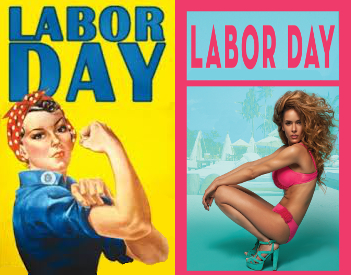The first Monday in September is the United States federal holiday of Labor Day. Even though the autumn equinox is still weeks away, Labor Day symbolizes the end of summer.

Labor Day – Then and Now
Labor Day Traditions
Traditionally, Labor Day is a celebration of workers and all the contributions they make to society, both economic and social. It is a time for parades and barbecues; however, it was first celebrated after the Pullman Strike in the summer of 1894, to placate union members. If you live in the San Francisco Bay Area or have heard news stories about our BART system, the story of the Pullman Strike makes the BART strikes seem tame by comparison.
The Pullman Strike of 1894
The Pullman Strike of 1894 pitted the American Railway Union (ARU) against the Pullman company, the railroads, and the federal government of the United States.
The Panic of 1893 was a serious economic depression that elevated unemployment for over 6 years. By 1894, the demand for Pullman Palace Car Company’s new passenger cars plummeted and the company’s revenue dropped. Workers were laid off and wages were cut. To compound the problem, Pullman ran a company town on the south side of Chicago. When workers complained that their wages were reduced, but the rents and other costs in the company town were not, George Pullman, refused to lower rents or go to arbitration, and there was a call for a strike.
The Pullman workers were not unionized, but Eugene Debs brought in the ARU and the strike was called. Pullman refused to negotiate with the ARU, and little progress was made, until…
Boycott the Product not the Company
The ARU organized a boycott against all trains that used Pullman rail cars. This included 27 states, and hit the Western United States the hardest. Other labor unions of U.S. railroad workers (the Railroad Brotherhoods) and American Federation of Labor (AFL) opposed the boycott. Riots ensued. Thirty people died and millions of dollars in damages occurred.
When mail service was hampered, President Grover Cleveland ordered in the Army to stop the strikers from obstructing the trains. When Debs and the AFU persisted, he and the other union organizers were arrested. Clarence Darrow, a high profile American lawyer and a member of the American Civil Liberties Union (ACLU) could not keep Debs out of prison, and the ARU dissolved.
The Aftermath
Most public opinion was on the side of President Cleveland; however, Democrats in the South and West denounced him. In 1894, in an effort to make amends with organized labor, President Grover Cleveland and Congress designated Labor Day as a federal holiday. Legislation for the holiday was pushed through Congress six days after the strike ended.
Celebrate
While much has changed since 1894, many of the concerns that workers have remain the same. So if you get the opportunity to celebrate this Labor Day, remember the workers. Retailers certainly do. The sales during Labor Day weekend are second only to Black Friday. As a result more workers will be working longer hours. The NFL and College Football seasons are starting this week. NASCAR has the AdvoCare 500 at the Atlanta Motor Speedway, and the NHRA has its U.S. Nationals in Indianapolis.
If the weather is good, get outside, go for a ride, take a hike and most importantly, enjoy yourself, because Labor Day marks the end of Summer.
Previous Post Next Post